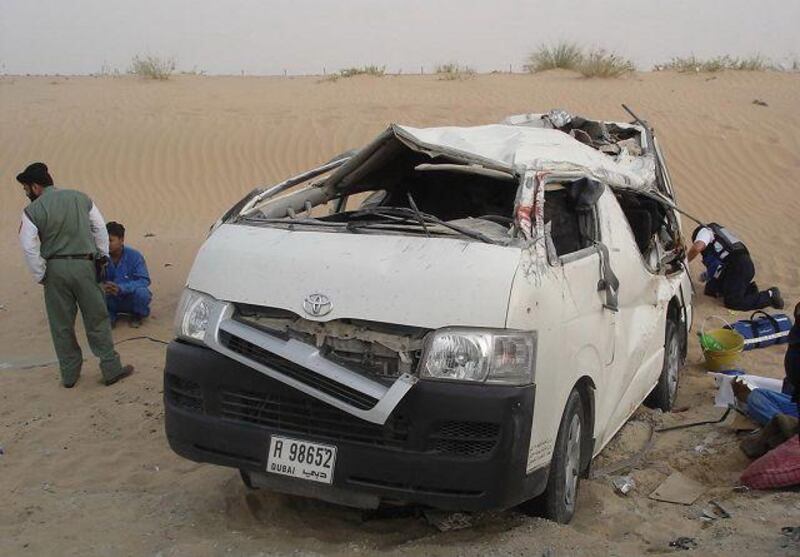DUBAI // Road safety experts in Dubai are calling for tougher measures to restrict minivans and buses from speeding after two fatal accidents this month. Imposing tighter speed restrictions and banning the vehicles from the fast lanes of motorways were among the legislative measures put forward.
Salah Bu Farousha, head of Dubai Traffic Public Prosecution, said the speed of minibuses, and particularly minivans, should be restricted. "We need help from the media about this problem," he said. "The problem is the small van with 14 passengers and the low safety levels of the vans. My opinion is that the drivers of this car should not be going more than 80kph." He said many fatal accidents could be prevented if vans travelled more slowly.
The RTA has already put speed restricters in taxis on a trial basis with plans to place them in every taxi over the coming months. Over a three-day period this month there were three separate minivan accidents, two with fatalities. On May 14 three people were killed and three seriously injured when a minibus crashed into a pick-up truck at a service road near Jebel Ali's new airport. On May 16, two people were killed and 10 injured when a water tanker collided with a minibus on Al Kassarrat Roundabout in Jebel Ali. The driver of the tanker appears to have been at fault, according to police.
On May 10, eight workers were taken to Rashid Hospital Trauma Centre with moderate injuries following an accident on Al Khail Road. Their minivan flipped after the speeding driver lost control and ploughed into the barrier, which prevented the vehicle from landing on the opposite side of the motorway. The driver had been "reckless" and would face prosecution, a Dubai Police spokesman said at the time.
Kailash Chandra Tiwari, principal engineer and planner in traffic and transportation at KEO International Consultants, has called on the RTA to look at international minivan standards. "I have been strongly recommending prohibiting current Toyota, Nissan, Ford and GM type minibuses to operate on the two fast-lanes on eight, 10 and 12-lane expressways and freeways," said Mr Tiwari, who has worked as a traffic management and road safety specialist with the engineering consulting firm SMEC Australia and with the World Bank.
He said in the UK Best Practice Minibuses Crash Assessment, the limiter restricts the maximum powered speed of the minibus to 100kph. "Minibuses fitted with a limiter cannot use the outside lane of a motorway that has three or more lanes," he said. "Speed limits for minibuses should be restricted to 90 kph for school, tourist and worker-minibuses." Basil Shaaban, the UN's World Youth Ambassador for Road Safety, said prohibiting certain vehicles from occupying the fastest lanes was a common practice in developed nations.
"Along with imposing a lower motorway speed limit on such medium-heavy vehicles, such measures can be highly effective in reducing road injuries and fatalities, particularly in countries where such transport vehicles are involved in a significant percentage of accidents," said Mr Shaaban, a Lebanese national who grew up in Abu Dhabi and is also a Formula 3 driver. He also said it would increase visibility for smaller vehicles. "It reduces the collision-risk between the two types of vehicles, as their road dynamics can be very different," he said.
The Roads and Transport Authority (RTA) said there were no plans to implement such restrictions, but that laws prohibiting lorries from travelling on certain roads at busy times were being reviewed. "Currently the RTA is conducting a comprehensive truck and freight movement study for Dubai," said Nasser Abu Shehab, director of strategic transportation planning at the RTA. "The mentioned study includes reviewing and evaluating the current ban times and routes. No solid recommendations are yet formulated."
eharnan@thenational.ae






